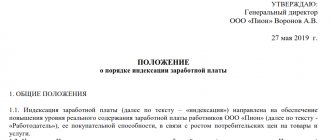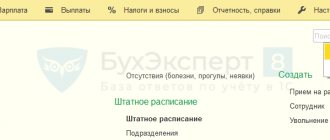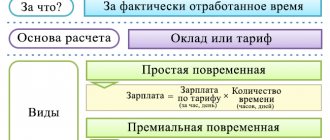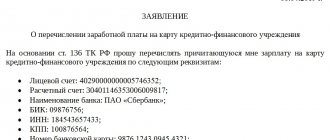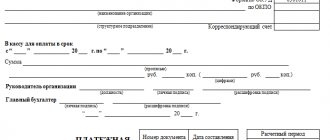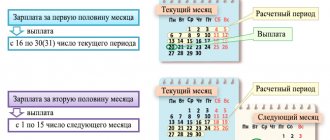ATTENTION! Wage indexation in 2022 in commercial organizations
Inflation is a process that does not need to be proven to anyone who has made expenditures at intervals over time. Part 1. Article 61 of the Civil Code of the Russian Federation states that this fact is generally known and does not need proof.
Is the employer obligated to index wages ?
It follows from this provision that the nominal wages established for workers are constantly reducing their purchasing power . It turns out that by spending the same amount of time and effort, working people will be able to acquire in return less and less material goods.
In order to at least partially compensate for this injustice, the Labor Code stipulates the obligation to index wages .
How this obligation is implemented in practice, what are the features of the indexing mechanism, and how this process is regulated by documents, we will consider below. We will also analyze how to act for an employee whose salary diverges significantly from the level of consumer prices, and the entrepreneur does nothing to improve the situation even a little.
Question: Is it necessary to index the wages of all employees of an organization, regardless of its level, or can we limit ourselves to indexing the wages of employees who have a minimum wage? View answer
What is wage indexation
When working, any person should be sure that he provides himself and his family with at least the minimum necessary opportunities for life. This standard is intended to be guaranteed by the established minimum wage - the amount of wages below which no employer can set the bar.
How to determine the indexation coefficient of wages for employees in an organization?
Since the cost of living is constantly growing due to the process of inflation, this requires a constant increase in the material component of labor remuneration. Art. 130 of the Labor Code of the Russian Federation affirms the worker’s right to increase the real content of financial stimulation of labor, and Art. 134 specifies a specific mechanism for this – indexing.
Indexation is a means to ensure that labor income matches the purchasing power of the funds received, or at least to minimize the discrepancy. It consists of adjusting nominal wages (tariffs, salaries, rates) for a given time period depending on the level of inflation.
Types of indexing
Depending on the time when the employer plans to carry out indexation, it can be divided into 2 types:
- retrospective (prices increased first, and wage increases were made “to catch up” to compensate for their growth);
- proactive (salaries are increased in advance, anticipating a price jump).
Question: Does the employer have the right to set a wage indexation coefficient of 0.1% of the increase in consumer prices? View answer
Reasons for salary increases
The decision to pay wages is made within the company. It is usually motivational in nature and takes into account the individual value of each employee. Salaries are increased for the following reasons:
- Increasing income levels. A company claiming a leading position in the market can increase wages for staff to increase its competitiveness in the market and attract more qualified personnel by increasing the cost of work. This allows you to set higher demands on candidates, as well as increase your status among competitors.
- Incentives for employees on an individual basis. If a company is interested in a highly qualified specialist, in order to retain him in the workplace and stimulate professional development, he may be interested in a higher salary.
- Retention in the labor market. Labor costs tend to increase over time. To maintain its position and prevent staff turnover, the company must periodically increase monthly payments to at least the average market level.
Is it necessary to notify an employee about a salary increase ?
The law obliges the employer to index wages
IMPORTANT! A sample of the Regulations on the procedure for indexing wages from ConsultantPlus is available at the link
The law affirms the absolute obligation of the employer to promote the welfare of its employees and the adequacy of the real content of wages. Art. 134 of the Labor Code of the Russian Federation calls indexation a direct duty of any employer, no matter in what area it operates - budgetary or commercial.
Thus, there can be no discrepancies here - the employer is imperatively required to carry out indexing. However, the provisions of this article do not allow for its unambiguous interpretation. So, from them it is impossible to draw an exact conclusion about:
- timing of indexation;
- its frequency;
- salary indexation procedure.
Since the indexation procedure is not prescribed in basic laws, it must be regulated by employers in internal regulations:
- when concluding employment contracts (individual and collective);
- when drawing up any agreements, including amendments to contracts;
- in a separate local regulatory act;
- in the industry agreement.
ATTENTION! If the enterprise does not have a document with indexation regulations or its mechanism is not mentioned in the text of the employment contract or collective agreement, this does not relieve the employer of obligations before the law. The document must be developed or changes and additions must be made to existing acts. The absence of such provisions is a direct violation of the requirements of the Labor Code.
Since modern labor legislation in terms of regulating indexation is imperfect, bills are being introduced calling for changes to a number of ambiguous formulations aimed at creating a more precise concept of the wage indexation procedure and its imperativeness.
Hot ten questions about wage indexation in 2022
Calculating Subscription!
Now you can get a subscription to the magazine “Calculation” for free together with the berator “Practical Encyclopedia of an Accountant”. Limited offer, hurry up! Connect the berator with “Calculation”
Every year, the authorities issue letters, orders and reminders that everyone is obliged to increase workers’ wages and threaten to tighten requirements for private firms.
Article 134 of the Labor Code of the Russian Federation obliges employers to index wages.
It establishes that government agencies and government agencies, as well as local governments, index wages in the manner established by labor legislation and other regulatory legal acts containing labor law standards, other employers - in the manner established by the collective agreement, agreements, and local regulations.
Moreover, wage indexation is not a right, but rather an obligation of the employer; the company’s local documents must specify the indexation procedure or adopt separate regulations on indexation.
Now commercial firms have the right to choose exactly how to index wages: according to the level of consumer prices or the level of inflation.
As the Supreme Court of the Russian Federation indicated in Review of Judicial Practice No. 4/2017 dated November 15, 2017, employers who do not receive budget funding have the right to choose any procedure and conditions for its implementation.
Including: frequency, procedure for determining the amount of indexation, list of payments subject to indexation, taking into account specific circumstances, specifics of activity and level of solvency.
Are changes really being prepared to the Labor Code of the Russian Federation obliging private companies to index wages?
The State Duma has several times considered issues related to tightening requirements for wage indexation. A similar bill on amending Article 134 of the Labor Code of the Russian Federation is now in plans for consideration.
The new version of Article 134 of the Labor Code of the Russian Federation contains a rule obliging all commercial structures to annually index workers’ wages and introduces a single indicator of profit, mandatory for all. And it doesn’t matter in what amount: it can be 100 rubles or 100 million.
It is planned to base indexation on the growth rate of consumer prices for goods and services.
In the new edition of Article 134 of the Labor Code of the Russian Federation, they want to establish indexation periods: at least once a year and no later than 4 months after the end of the financial year, that is, before May 1 of each year.
But for now these are just plans, and neither the timing of consideration of the bill nor the timing of the introduction of new norms of the Labor Code of the Russian Federation into force are unknown.
For 2022, the rules for wage indexation by commercial firms remain the same.
Is it necessary to enter into an additional agreement after salary indexation?
Since the employee’s salary changes during the indexation process, the conclusion of an additional agreement to the employment contract becomes mandatory.
The size of the tariff rate or salary must be specified in the employment contract with each employee in accordance with the requirements of Article 57 of the Labor Code of the Russian Federation.
In accordance with Article 72 of the Labor Code of the Russian Federation, changes in the terms of an employment contract determined by the parties are allowed only by agreement of the parties to the employment contract, which is concluded in writing.
Accordingly, when indexing wages, it is necessary to conclude an additional agreement to the employment contract.
Is it necessary to index the wages of employees on maternity leave?
According to Articles 2 and 134 of the Labor Code of the Russian Federation, wage indexation must be provided to all persons working under an employment contract.
If the salary of workers on maternity leave is established by the staffing table, indexation of salaries according to the staffing table should be carried out for everyone, including women on maternity leave.
That is, indexation according to the staffing table means that you are obliged to increase the salaries of everyone who is on the staff.
A woman on maternity leave, having learned about the indexation of wages in the company, has the right to demand an increase in her salary, including through the court. She will most likely win the case and you will have to retroactively index her salary.
It is possible to avoid indexation of the salaries of those who are temporarily not actually working if the local documents of the company or the Regulations on Indexation provide for indexation conditions that those who are not working cannot fulfill. Among them, for example, such as achieving certain financial results, etc.
Indexation can be carried out not according to the entire staffing table, but by divisions and based on established indicators.
Is it possible to index the salaries of management and employees differently?
Rostrud considers it incorrect to introduce different percentages of salary indexation for different categories of workers.
Indexation applies to all employees. It is carried out in connection with rising prices for goods and services, and for all workers living in the same region, wages need to be increased equally.
According to the order for wage indexation, the wages of all employees must be increased by the same level.
Do employees need to be informed about indexation?
If a company plans to index wages under Article 134 of the Labor Code of the Russian Federation, there is no need to notify employees about this.
But, since, according to paragraph 5 of part 2 of Article 57 of the Labor Code of the Russian Federation, the size and composition of wages (including the size of the tariff rate or salary, the employee’s official salary, additional payments, allowances and incentive payments) is an essential condition of the employment contract, after indexation the company must sign with an additional agreement by the employee, which indicates the new amount of his salary.
The procedure for indexing wages in a commercial company is established by regulations, collective agreements, agreements or other legal regulations.
Is salary indexation carried out annually?
The current legislation does not establish the frequency of wage indexation, but the employer must carry it out regularly.
There is no direct requirement for annual indexation in the Labor Code. According to Article 134 of the Labor Code of the Russian Federation, wages should increase in connection with rising consumer prices. The purpose of wage indexation is to smooth out the decline in wages caused by rising prices for goods and services. While prices are rising, wages need to be indexed, and this should be done at least once a year.
Rostrud requires employers to carry out indexation every year. At the very least, at least once every two years.
In any case, Article 134 of the Labor Code allows employers to carry out indexation in the manner established by the collective agreement, agreements, LNA and independently determine the frequency, for example, once a year at the beginning of the year or quarterly at the beginning of each quarter.
When are premiums not considered fixed and not subject to indexation?
The employer is obliged to carry out indexation of wages annually in connection with the increase in consumer prices for goods and services in accordance with the requirements of Article 134 of the Labor Code of the Russian Federation. But incentive payments to employees are not always subject to indexation.
Bonuses, allowances, and additional payments do not need to be indexed.
Only those bonuses that are set at a fixed amount need to be indexed simultaneously with the salary. The employer is not required to index bonuses that are set within a range of values.
Only those payments are subject to indexation, the amount of which is calculated based on the salary as a multiple or as a percentage and always in a certain amount (fixed). For example, the bonus is set at 40% of the salary.
If a company has a range of values established in its Regulations on Remuneration or Regulations on Bonuses, for example, from 20% to 100% of the salary, then bonuses cannot be considered paid in a fixed amount. And they don't need to be indexed.
Can indexing thresholds be set?
Yes, a company, using Article 134 of the Labor Code of the Russian Federation, can independently determine the indexation procedure. And it has the right to set a threshold amount within which employee income will be indexed in full.
For example, it is possible to stipulate in the Regulations on Indexation that certain payments to employees are subject to indexation, for example, salaries within an amount not exceeding 50,000 rubles, tariff rates, piecework and time rates. Or go the opposite way and establish that the following are not subject to indexation: part of the salary exceeding 50,000 rubles, additional payments, allowances, bonuses set in a fixed amount, and so on.
Is it possible not to index salaries due to the organization’s unsatisfactory economic performance at the end of the year?
Yes, if the financial situation of the company does not allow increasing the wage fund, the courts side with the employers.
If indexation pushes the company toward bankruptcy, the situation will be worse than simply maintaining wages at the same level.
The courts believe that the employer’s obligation to index wages is not unconditional, but depends on various factors, including the economic indicators of the enterprise.
More on the topic:
A business that “shows” profits will be required to index salaries
Salary increase: is it considered indexation?
Different salary indexation for managers and employees: is it legal?
What indicator should be taken for wage indexation in 2022?
The organization independently selects a favorable value for indexation. This could be the consumer price index, the percentage of inflation or the increase in the cost of the consumer basket. If you take the inflation rate in the country as a basis, then remember that this indicator can be found in the law on the federal budget for the next three years. For example, for 2022 inflation is planned at 3.7%.
But on September 21, 2022, at a meeting, the government raised the inflation forecast for 2022 from 5.0% to 5.8%, calculating that prices would increase by 0.3% per month in the fourth quarter. At the end of nine months of 2022, inflation turned out to be much higher than planned and may rise further. The final data for the year will be announced by Rosstat in 2022.
Another starting point for determining the value of a salary increase may be the cost of living in Russia as a whole or in a specific constituent entity of the Russian Federation. Starting from 2022, the cost of living in Russia as a whole is set for the next year until July 1 of the current year.
The cost of living in 2022 is 12,702 rubles, in 2022 - 13,026 rubles according to Decree of the Government of the Russian Federation of June 30, 2021 No. 1070. Growth - 2.7%. The cost of living per capita in a constituent entity of the Russian Federation is established before September 15 of the current year for the next year, taking into account the coefficient of regional differentiation. For example, in the Moscow region, the cost of living for the working population in 2022 is 14,987 rubles, in 2022 - 15,394 rubles, according to Decree of the Government of the Moscow Region of August 24, 2022 No. 706/29. Growth – 2.7%.
Another indicator is the increase in consumer prices for goods and services. The consumer price index is officially published every month by Rosstat and its territorial bodies. In September 2021, compared to August 2022, the consumer price index increased by 6%.
Basic indicators, such as the consumer price index and inflation, are not mandatory values. The company has the right to choose another arbitrary value. The main thing is that indexation takes into account the rising cost of living.
Inflation-indexation spiral
As a result of inflation, prices rise and the entrepreneur raises wages. In turn, as prices increase, production costs also increase, that is, costs increase. To avoid loss, the manufacturer must raise the cost of its goods and services. Raising prices again means inflation.
In order to at least slightly reduce the rate of increase in this “spiral” , some restrictions are provided for the indexing mechanism.
Indexation is aimed at compensating not for any price jumps, but only for those associated with inflation. The rate and size of inflation is monitored at the state level; other factors of a market economy are less amenable to accounting and control.
Not any income is subject to indexation, but only those that are controlled and regulated by government bodies (wages, pensions, social benefits).
Additional protection is not needed for the income that the owners bring to their private property and business activities:
- Rental Property;
- trade in personal property;
- income from private farms and subsidiary plots;
- profit from other types of legal activities.
Owners and businessmen themselves regulate the level of costs and income by freely setting prices for their goods and services.
Where to get funds for indexation
How can regular salary increases be carried out in conditions of inflation? For this, there are official sources, different for certain areas of activity:
- budgets of different levels - for public sector workers;
- Pension Fund of the Russian Federation - for calculating pensions;
- Federal budget, social insurance funds - for social payments;
- own funds - for commercial entrepreneurship and the private sector of the economy (current income or retained earnings of past years).
Indexation of wages for public sector employees in 2022
There is no specific date for recalculating salaries for public sector employees in 2022, as well as a common percentage for everyone by which income should increase.
Let us explain that state employees are divided into 2 groups:
- those whose salary is increased under the terms of the “May decrees” of the President of the Russian Federation: doctors, physicians, teachers, university professors, scientists, cultural workers, etc.;
- those who were not included in the “May decrees”: civil servants, judges, prosecutors, military personnel and equivalent persons.
Salary increases for these categories are different. For the first group, incomes will increase by 6% - this is the forecast growth in nominal wages contained in government information. The change will take place from 09/01/2019. For the second category, salaries should increase by 4.3% from October 1, 2019 - this value is considered the official inflation figure for 2022. Increasing wages by this percentage is the minimum obligation of the state.
Indexation coefficient
How exactly to index and how much to raise wages depends on the indicator chosen by the employer and fixed in the documents specified by law. It is permissible to use it as:
- consumer price index, which is established in a specific region or throughout the country (according to official data from Rosstat);
- inflation rate included in the federal or regional budget;
- the cost of living for the population;
- any objective indicator of rising prices for goods and services.
How to register a position
Salary indexation in the wage regulations must be stipulated taking into account a number of positions. The regulation must contain the procedure for calculating amounts and establishing coefficients. The guideline could be:
- consumer price index (information is posted on the website of Rosstat of the Russian Federation);
- inflation rate (determined annually in federal and regional laws);
- the minimum wage for persons capable of working (determined by the Government of the Russian Federation and regional legislators).
A sample provision on the wage indexation procedure includes information about the period, timing of the procedure and other conditions, including:
- fixation of specific types of payments subject to recalculation;
- the presence of a formula for calculation and rules for establishing the coefficient;
- determination of the period from the beginning of which new salaries are subject to application;
- a list of documents that may reflect the results of salary increases (staffing schedule, labor agreements, etc.);
- identification of persons responsible for the implementation of the procedure;
- establishing an algorithm for agreeing on a document with the trade union.
Having developed the regulation, the manager signs a local act on its approval and entry into force.
Upon publication of a salary increase regulation, all employees should be familiarized with it. To do this, provide a special block in the regulations where employees will sign.
Does the employer neglect indexation?
This is a violation of the law, fraught with administrative liability. The labor inspectorate, having recorded such a violation, can provide infringed employees with protection of their violated rights, forcing the negligent entrepreneur to correct the mistake and answer according to the law. To do this, employees will need to go there with a complaint that the company does not have or does not comply with the wage indexation procedure.
IMPORTANT INFORMATION! Many are afraid to contact the labor inspectorate, not knowing about their right to demand that the employer not provide information about the author of the complaint in accordance with Part 2 of Article 358 of the Labor Code of the Russian Federation. At the same time, it will also not be possible to apply anonymously: complaints without authorship will not be considered.
You can also go straight to court; it happens that the claim is made on the proposal of the control authorities. The period for this is 3 months from the day the worker realized that his rights were infringed (this may be the day the non-indexed salary or advance payment was calculated).
ATTENTION! In most cases, the court will simply oblige the entrepreneur to develop and accept an indexation provision if the claim does not contain additional requirements.
What managers of commercial organizations should know about indexing
It is necessary to index the wages of all employees who are registered under an employment contract; thus, wage indexation cannot be selective, otherwise it will be regarded as an infringement of the labor rights of some workers. Commercial employers have the right to determine the frequency of this event independently. However, the enterprise must have local regulations stipulating the procedure and frequency of recalculation of wages. For example, in commercial organizations an order may be issued to index wages in 2020 and in subsequent years.
Some companies have developed and use a local act called the Regulations on wage indexation for specific years. It contains information about a possible option for resolving the relationship.
Mandatory measures to increase earnings include not only wage indexation. From January 1, 2022, the minimum wage has changed. Now it is 11,280 rubles. And if one of the employees received wages below the minimum wage, it is the employer’s responsibility to raise it to the minimum level.
